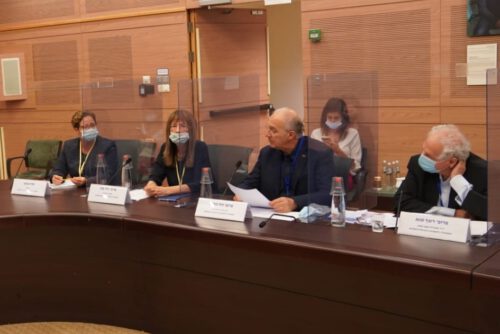The third triennial report on the state of science 2019/XNUMX published by the Israel National Academy of Sciences was brought up for discussion before the Science and Technology Committee. The decision makers in Israel with proper investment and provision of required resources."

The Science and Technology Committee of the Knesset chaired by MK Einav Kabela dedicated yesterday, November 10, the discussion in the committee to the presentation of the triennial report on the state of science 2019/XNUMX published by the Israel National Academy of Sciences.
The goals of the report are to provide an up-to-date picture of the state of science and research in Israel and to set new goals and challenges for the coming years. The committee appointed by the Academy to prepare the report was composed of members of the Academy and members of the Israeli Young Academy and was headed by Prof. Reshef Tana.
The main recommendations of the report:
- should be increased Public investment in basic research in Israel, to compete with advanced countries.
- The necessary resources must be allocated to continue its extensive activities in the R&D programs of the European Union.
- The budget of the bilateral funds should be increased, especially of The German-Israeli Foundation for research and to establish additional joint research programs with countries such as Great Britain and Switzerland characterized by distinct scientific excellence.
- The system that supports research done by doctors should be thickened, and the framework of a program should be expanded "doctor-researcher" Also for the framework of qualified studies in research institutions.
- National research frameworks operating outside the universities must be recognized"national laboratories" and increase their activity.
- Investment in infrastructure in the humanities and social sciences should be encouraged as part of the investment in national infrastructure, and new competitive programs should also be established in the humanities and social sciences to outstanding scientists in extensive scopes.
maintain academic freedom
Prof. Neely Cohen The President of the Academy said that "The National Academy hopes that the decision-makers will be attentive to the recommendations of the State of Science report, will act to implement them, to ensure the solid status of science and research in Israel, partly through adequate budgeting. These difficult days once again prove the need to invest resources in the fields of science, as well as the need to maintain academic freedom of action, which is a condition for thriving, boundary-breaking research that advances not only our knowledge of the world, but works for our well-being and the well-being of the entire world."
Prof. Tana said at the yeshiva that "the investment in basic research in Israel is insufficient. The scientific outputs of the State of Israel place it in the group of advanced countries. Thanks to the wonderful human capital in Israel, we manage to partially overcome a large gap in inputs for basic research. Israel's scientific achievements are expressed in a wide variety of fields and parameters."
At the discussion, the Vice President of the Academy surveyed Prof. David Harel the academy's activity as a response to the corona crisis and expanded on the issue of the importance of biomedical research that appears in the academy's reports.
On this subject he noted Prof. Daniel Zeifman, chairman of the National Science Foundation, that "one of the biggest scientific revolutions in the last decade is in the field of biomedical research," and added that "even though Israel has a very good medical system, mainly because of the quality of the doctors, and basic academic biomedical research of excellent quality, mainly Thanks to the quality of the scientists at the universities, the connection between them is almost non-existent: the participation of physician-researchers working in the hospitals in the research is almost non-existent in Israel." He also added that a comprehensive program of support for joint research of physician-researchers with academic researchers should be a priority of the scientific research strategy in Israel. Prof. Zeifman concluded by announcing that "the National Science Foundation is working on developing a support program in this area, and we hope that it will soon become part of the research landscape in Israel."
Prof. Eli Keshet, The member of the academy and co-author of the report, emphasized that the enormous changes that have taken place in medical research are now opening up new and exciting medical possibilities and require new multidisciplinary assessments. This initiative should also include optimal utilization of the great potential inherent in physician-researchers and the collaboration of
Researchers from other fields of knowledge such as data science and engineering. He also added that the National Academy is working on promoting biomedical research in these directions as well.
Prof. David Harel added that he "welcomes the cooperation with the Science Committee, the Ministry of Science, the Ministry of Science and Technology and the National Science Foundation and all the bodies that support medical and biomedical research."
The discussion in the report also touched on issues related to the humanities and social sciences, and the member of the academy Prof. Israel Bartel, the member of the State of Science Report Committee, insisted on the vitality of research in the humanities and social sciences to foster excellence and encourage research innovation in all fields of science. He focused on the recommendations regarding projects to encourage the interfaces between theoretical science and experimental science, on programs to support research and to strengthen the infrastructure for optimal training of the next generation of researchers in the humanities and social sciences.
